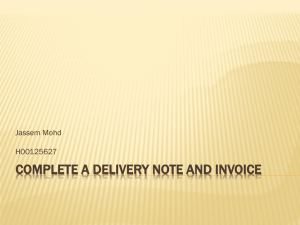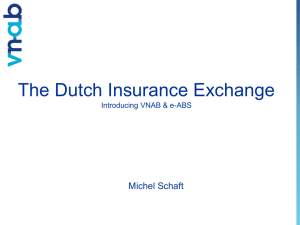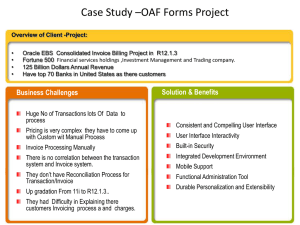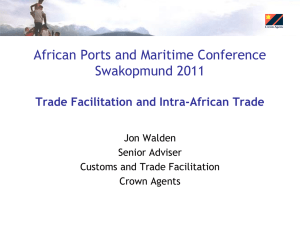Why a clearing instruction?
advertisement
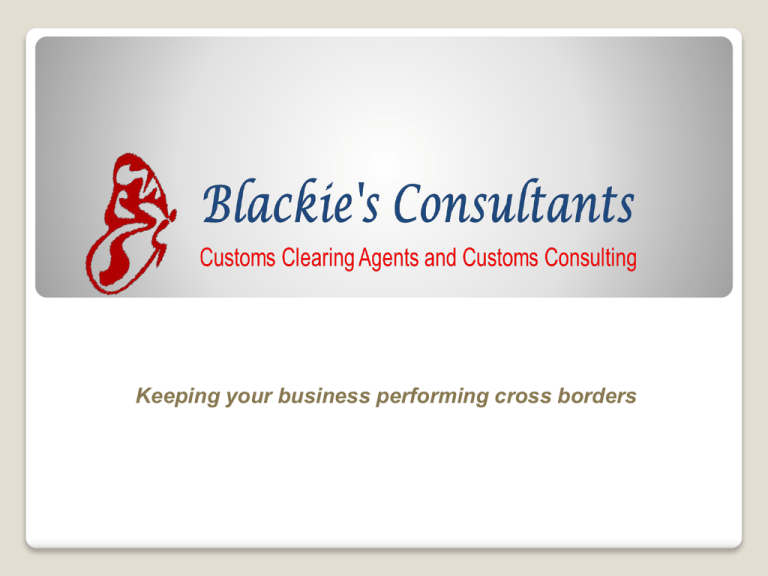
Keeping your business performing cross borders In this booklet, we would like you, our client, to have a good clear understanding regarding the following scenarios: 1. 2. 3. 4. Direct Export Indirect Export Imports Goods in Transit When you see a red block like this one, please read the information recorded in it. It is vital information. You need to understand who is responsible for what, why and the process on both SARS and LRA side. This knowledge will equip you to make better informed decisions, plan you exports/imports better and ‘read’ the status of your entry. All in all, you will be better equipped for the aftermath of trading across borders. But before we get to all of that, let us first and foremost touch on the most sensitive of subjects that causes so much chaos in this business industry: COMMUNICATION 2 Communication Communication 1. 2. • • • • Clearing Agreement Clearing Instruction • • • • • • • Direct Export Indirect Export Imports Goods in Transit Who is responsible for the transport Who is in charge of the delivery Type of invoice to be issued Vat payable, by who and when Documents to be secured and archived What is SARS Customs Role What is LRA Role Submitting wrong inaccurate information has a major ripple effect. 3 Communication In this exercise we will determine how important: * Clear * Understandable * Detailed Communication is, especially in our trade. At some point in every business manager /owner’s life the lack of communication or the incorrect information that was communicated, had some sort of chain reaction that resulted in some sort of effect in their business. In the customs trade, all information must be considered vital and should be presented truthfully and in full, for the wrong or incomplete information can lead to great costs in penalties and delays. 4 Let us have a look at the 2 most vital documents that marks the start of the agreement entered into, when submitting an entry for clearing: 1.Clearing Agreement 2.Clearing Instruction Clearing Agreement… This document has been created to protect both you the client and the clearing agent. It states, that if you, the client, give false/incorrect information, that you, the client, will be held liable for any penalties that might occur. Should the clearing agent miss represent you, the client’s information, the clearing agent will be held liable for any penalties that might occur. As per the Customs Act 98. Liability of principal for acts of agent.—Every importer, exporter, master, container operator, pilot, manufacturer, licensee, remover of goods in bond or other principal shall, for the purposes of this Act, be responsible for any act done by an agent acting on his behalf, whether within or outside the Republic. The clearing agreement is like a cover page for the clearing instruction. When attaching your invoices make sure that the destination is that of the foreign entity. Clearing Instruction… This document has been created for the client to record all relevant information the clearing agent might require to process/generate their entry. The client alone must complete this form as to exempt the clearing agent recording false/incorrect instructions from the client. 5 In detail this means… Clearing Agreement Read through the Clearing Agreement. In simplified terms it says: 1. The client gives us, Blackie’s Consultants permission to use their Importers/Exporters code. 2. Blackie’s Consultants agree to use the client’s Importers/Exporters code only with written permission from the client in the form of a Clearing Instruction. 3. Blackie’s Consultants will not be held responsible for any fault occurred by the client being negligent in recording and verifying of in formation of the load/goods. 4. Blackie’s Consultants will only take responsibility when they have misrepresented the information given by the client. 5. The client agrees to give Blackie’s Consultants correct, accurate information regarding: 1. The description of the goods 2. The quantity of the goods 3. The value of the goods 4. The weight and packaging of the goods 5. The transporting vehicle’s details 6. The destination and arranged dates 6 As per the Customs Act 99. Liability of agent for obligations imposed on principal.—(1) An agent appointed by any master, container operator or pilot or other carrier, and any person who represents himself or herself to any officer as the agent of any master, container operator or pilot or other carrier, and is accepted as such by that officer, shall be liable for the fulfilment, in respect of the matter in question, of all obligations, including the payment of duty and charges, imposed on such master, container operator or pilot or other carrier by this Act and to any penalties or amounts demanded under section 88 (2) (a) which may be incurred in respect of that matter. [Sub-s. (1) substituted by s. 34 (a) of Act No. 112 of 1977, by s. 71 (a) of Act No. 30 of 1998 and by s. 138 of Act No. 60 of 2001.] (2) (a) An agent appointed by any importer, exporter, manufacturer, licensee, remover of goods in bond or other principal and any person who represents himself to any officer as the agent of any importer, exporter, manufacturer, licensee, remover of goods in bond or other principal, and is accepted as such by that officer, shall be liable for the fulfilment, in respect of the matter in question, of all obligations, including the payment of duty and charges, imposed on such importer, exporter, manufacturer, licensee, remover of goods in bond or other principal by this Act and to any penalties or amounts demanded under section 88 (2) (a) which may be incurred in respect of that matter: Provided that, except if such principal has not been disclosed or the name of another agent or his own name is stated on the bill of entry as contemplated in section 64B (6) or the principal is a person outside the Republic, such agent or person shall cease to be so liable if he proves that— (i) he was not a party to the non-fulfilment by any such importer, exporter, manufacturer, licensee, remover of goods in bond or other principal, of any such obligation; (ii) when he became aware of such non-fulfilment, he notified the Controller thereof as soon as practicable; and (iii) all reasonable steps were taken by him to prevent such non-fulfilment. [Para. (a) amended by s. 24 of Act No. 86 of 1982, by s. 62 (a) of Act No. 45 of 1995, by s. 71 (b) of Act No. 30 of 1998 and by s. 68 (a) of Act No. 53 of 1999.] (b) No importer, exporter, manufacturer, licensee, remover of goods in bond or other principal shall by virtue of the provisions of paragraph (a) be relieved from liability for the fulfilment of any obligation imposed on him by this Act and to any penalty or amounts demanded under section 88 (2) (a) which may be incurred in respect thereof. [Para. (b) substituted by s. 71 (c) of Act No. 30 of 1998.] (c) For the purposes of the proviso to paragraph (a) a principal outside the Republic shall be deemed to include the consignee 7 in a country outside the Republic shown on a bill of entry for removal in bond of imported goods. In detail this means… When trading cross border, we have now established that communication is of vital importance. When conducting business with Blackie’s Consultants it is compulsory to start with a Clearing Instruction. This is the very first form of communication between us and you, our client. Why a clearing instruction? As per the Customs Act, 39(c) The said person shall further produce the transport document or such other document in lieu thereof as may be approved by the Commissioner, invoices as prescribed, shipper’s statement of expenses incurred by him, copy of the confirmation of sale or other contract of purchase and sale, importer’s written clearing instructions, unless exempted by rule, and such other documents relating to such goods as the Controller may require in each case and answer all such questions relating to such goods as may be put to him by the Controller, and furnish in such manner as the Commissioner may determine such information regarding the tariff classification of such goods as the Commissioner may require. What does this mean? This entitles the clearing agent to use the clearing instruction as a lawful legal document and declare it as compulsory. What is the functionality of the clearing instruction? The client completes the clearing instruction. This will act as a written instruction given to the clearing agent to: 1. Act on behalf of the client as the clearing medium 2. Utilize the recorded details on the clearing instruction to proceed with the clearing of the load. The client or any nominated member of the client’s company may complete the clearing instruction, at no point is a member of Blackie’s Consultants allowed to complete this form on behalf of the client. Blackie’s Consultants will not continue with any paper work until they have received a proper completed clearing instruction. 8 Completing of a Clearing Instruction 1. 2. 3. 4. 5. 6. 7. 8. 9. 10. 11. 12. 13. 14. 15. 16. The person’s name completing the document. The name of the company who is the consignor/transporter, requesting the clearing. The invoice number of the invoice that was issued with the purchase of the goods. Consignee is the company the goods are being taken too. The total amount of the invoice VAT exclusive. No. of Parcels – is the quantity that reflects on the invoice. The total weight of the specific line. Record a short detailed description of the goods on that line or the tariff code, should you have it. In case you record the tariff code, ensure 100% it is correct. The value of the line being recorded, VAT exclusive. The total of the whole invoice will need to balance with the whole total on the clearing instruction, VAT exclusive. An estimate needs to be given, to give SARS Customs any idea of when they can expect your load’s arrival. Driver’s name – just in case we need to contact them. Certain transport companies places an assistant driver on a truck. Certain transport companies places an assistant driver on a truck. The registration of the vehicle is required to generate the EDI documents. This must be the vehicle the goods are being transported on. Should this change for any unforeseen reason, you, the client, must notify the clearing agent of such change in writing immediately. The clearing agent needs the driver’s contact number in case they need to contact them regarding their paperwork. 9 17. 18. 19. 20. 21. 22. 23. CPC – Customs Procedure Codes. These 7 codes represent the 7 transactions you can action. Manifest number – not in use at the moment. Remember the permit you applied for? Your Exporters/Importers code goes here. SARS Customs requires you to nominate the border you are going to cross at. This is compulsory. Certain vehicles hook trailers of which the registration numbers need to be recorded as well. Certain vehicles hook trailers of which the registration numbers need to be recorded as well. In case we can not get hold of the driver, the clearing agent needs the company’s contact number for assistance. 24. The person completing the document needs to print their name, the day and the place it was signed at. 25. The person completing the document needs to sign the document. Now you can attach your invoice and submit them to the clearing agent. Always write in a neat clear handwriting. Request the Ms Excel format if you wish to complete your clearing instruction on a computer. Always make sure that your invoices are in a clear readable print. When your documents have been processed and have proceed to border status, the clearing agent will notify you and you can collect your paperwork from the nominated point or it will be emailed back to you for your perusal. 10 The details requested on the clearing instruction is of vital importance and is required by SARS Customs. Why? First and foremost as previously stated the clearing instruction protects both the client and the clearing agent. The clearing instruction is used as a direct instruction with details that are used when capturing and generating the entry with SARS Customs. How Blackie’s Consultants interpret a clearing instruction and why certain information is necessary and for who? 1. 2. 3. Firstly, does the client have a valid Importers/Exporters code. If not, they will be instructed to apply. Failure to comply will result in no future assistance. For SARS auditing purposes, it is important that each company has their own valid code. the clearing instruction must have been completed by a representative of the client’s company, should Blackie’s Consultants feel its incomplete it will be sent back to the client with a query. Blackie’s Consultants will then check if the invoices attached to the clearing instruction is in good clear readable print and relevant to the clearing instruction. This is time consuming as they need to check that all invoice numbers, descriptions and values as recorded on the clearing instruction corresponds. If not, they will be unable to continue, as the direct instruction differs from the actual invoices being presented. If a client wishes to make any changes, you the client must supply Blackie’s Consultants with a new clearing instruction. Never give another company your Importers/Exporters code to clear goods. The company that the code is registered for will have to take full responsibility for any penalties and audits that might occur. 11 Customs Procedure Codes Explained This is for BLNS Countries. What kind of Import/Export do I choose? CPC TYPE H61 Permanent Export A12 Permanent Import FROM (The country the goods are in) South Africa Lesotho TO( The country the goods are going to) Lesotho South Africa I76 Temporary Export I78 Re Importation of Temporary Export South Africa Lesotho Lesotho South Africa D37 Temporary Import D38 Re Export of Temporary Import Lesotho South Africa South Africa Lesotho B22 Goods moved in transit through South Africa Lesotho can be replaced by any other foreign entity, Lesotho was merely used for example purposes. 12 These are just a few of the basic terms you will deal with on a day to day basis. SARS Customs – South African Revenue Services Customs the above entity controls and enforces the South African side of the border, as per the stipulated rules and regulations by government and the SACU Agreement. CPC – Customs Procedure Code the type of transaction that is taking place between the nominated countries. Normally, it is permanent, temporary or transit. Clearing Instruction - Section 39 of the Customs Act empowers the Clearing Instruction to protect the interest of the clearing agent. A clearing instruction is an instruction given by the client on paper, to the clearing agent which must be signed and filled by the client. Tariff Code - It is a unique number allocated to every possible form of product that determines the import/export duties payable on such product. Exporters/Importers Code & Tin Number - Companies that wish to facilitate trade in a foreign entity, must register for an Importers/Exporters Code. This code is issued by SARS and states that the applicant for fills all the requirements to facilitate trade. UCR - For every cross border transaction between two foreign entities by law, is issued with a UCR Number, enables the two participating entities' financial institutes (the banks) to trace the money exchange that took place. 13 Consignor - This refers to the client/company from whom the goods are being exporter from. The sender of the goods. Consignee - This refers to the client/company to whom the goods are being exported too. The recipient of the goods. Consignment - Another term for the load/goods that are being sent. VAT - Value Added Tax determined value payable on all taxable goods as the tax law of the foreign entity states. It is a form of income to a country. VOC - Voucher of Correction This document is utilized to correct any mistake that was made during the processing and creating of a SAD500/501/507 or Road Manifest, the wrongful information is reported and the correct information is recorded and then submitted to SARS Customs for amendment and approval. Commercial Invoice - This document provides the client's company's details, the client's Exporters Tin number, the goods description, price and is Zero Rated for VAT. Tax Invoice - A document that shows the client's company details, the goods description, price, VAT paid and the client's Exporters Tin Number. BLNS - African Countries nominated to partake in the SACU Agreement, Botswana, Lesotho, Namibia, Swaziland 14 Up to this page we: 1. 2. 3. 4. Have determined the importance of communication. Have identified the two vital communication documents when entering documents for clearing Have had a look at the 7 most commonly used CPC codes and when to use which one. Have had a look at certain Clearing Jargon that is used when doing clearing. Now, we are going to go through the 4 main means of clearing: 1. 2. 3. 4. Direct Export Indirect Export Import Goods In Transit 15 Direct vs. Indirect Export Determining weather an export is direct on indirect is actually very easy. Just ask yourself the following question: Who is in charge of the delivery? Lets explain it a little bit better…in plain English… 16 Direct Export - when a Lesotho client buys goods from a South African supplier and the South African supplier transports the goods, either with his own transport or makes use of transporter, deliver the Lesotho client’s goods to them in Lesotho. The invoice must not have VAT on it since the Lesotho client is not in control of the transport and delivery. The Lesotho client will have to pay the VAT to the LRA at the time of crossing. 17 Schematic explanation of a Direct Export Lesotho Client buy goods in South Africa Lesotho Client Lesotho Client does not have transport and can not arrange transport. Delivery across the border Transporter The supplier uses his own transport or arranges transport in order to deliver the goods to the Lesotho client. The invoice made out by the South African Supplier MUST be Zero rated for VAT as the Lesotho client will be responsible it. Lesotho Client has to pay the VAT to LRA at the point of the goods crossing the border. 18 An Indirect Export is when a Lesotho client buys goods from a South African supplier and the Lesotho client comes to South Africa, picks up his/her goods themselves or by means of arranged transport and takes it to their place of business in Lesotho. In this instance the Lesotho client is in charge of the delivery of his own goods therefore the Tax invoice must have VAT on it. 19 Schematic explanation of an Indirect Export Lesotho Client buy goods in South Africa Lesotho Client Transporter The Lesotho client will then use his own transport or transport he has arranged to transport his goods. Lesotho Client Lesotho Client does have his own transport or has arranged transport for his goods to be picked up. Delivery across the border The invoice made out by the South African Supplier MUST be a Tax Invoice and have VAT recorded on it as the Lesotho client is in charge of the delivery. Lesotho client does not have to pay VAT at the LRA as the VAT was already paid by the South African Supplier when purchased. 20 Imports When you purchase goods from a supplier from a foreign entity. Regardless of who is in charge of the transport/delivery in this instance VAT is payable on the South African side to SARS. It is compulsory that clients use Blackie’s Consultant to handle their VAT payments on Imports, for which clients will be charged a handling fee. How does this work? 1. 2. 3. Paper work will be submitted as per normal, taking in regard the CPC is correctly indicated for an import. Blackie’s Consultants will after assessing the paperwork generate the documents up to the point where the system will request payment on which Blackie’s Consultant will issue the client with a VAT Invoice. Blackie’s can only proceed with payment as soon as they receive a proof of payment from the client. These monies are paid in to Blackie’s Consultants Finance account with SARS, which makes the allocation speediest and controllable. 21 IMPORTS From A Foreign Entity To South Africa 22 Goods in Transit When a foreign entity imports/exports to another foreign entity with no relevance to South Africa, merely passing through . South African borders, SARS Customs, are compelled to check that the serial numbers that the transport has been sealed with at the point of loading is the same as recorded on the original documentation. No duties, Vat is payable in this instance. Just tollgate fees. Duties and Vat is payable at the country/entity of destination. 23 Foreign Entities Goods in Transit Foreign Final Destination Passing Through Or Vice Versa… 24 VAT – Who pays what where & when in a nutshell… You are From Lesotho Buy Goods In Taking Goods To By What Means Recommended Invoice Pay VAT at South Africa Lesotho Own Transport Normal Tax Invoice South Africa Lesotho South Africa Lesotho Transporter Normal Tax Invoice South Africa Your Client is From Lesotho Buy Goods In Client Takes Goods To By What Means Recommended Invoice Pay VAT at South Africa You don’t know You don’t know Standard Tax Invoice Lesotho South Africa Lesotho You Deliver Zero Rated VAT Invoice LRA Who Pays Reason the VAT Client Original Tax Invoice will be handed in at the LRA Client Original Tax Invoice will be handed in at the LRA Who Pays Reason the VAT Client When a client buys goods from you and pays the normal VAT on your normal slip, you should regard them as just a normal client. You can not take responsibility for your client or their goods and must they use their own code to clear their goods, should they decide to cross border with it. SA company requires list of documents as stated below to proof to SARS the method of exportation * Never give your Importers/Exporters Code to anyone! By giving your code to a client, you are in fact taking responsibility for the cargo loaded onto their vehicle. You are also placing yourself into a difficult position when SARS conduct audits on your company, for you have to explain the exportation. * When clearing with a registered and licenced clearing agent, they will require you to fill out a Clearing Agreement, by which you give them, the agency to use your code and it will be followed with a Clearing Instruction attached onto every entry you would like to be cleared by the respective agency, by which you give them instructions as to what invoices, loaded on a certain vehicle, will cross the selected port of entry on a certain date, with the load of a stipulated value and quantity. * Clearing Goods Commercially - In order to successfully proof the method of exportation to SARS you need to keep record of the following documents: * C1 +C2 to proof the goods have been cleared and did exit the border at the stated date * Delivery Note / Waybill to proof physical delivery of goods in the cross border country * Zero Rated Invoice to proof that the client in fact did pay. * VAT Payments can be made via: CASH, Lesotho Cheque, EFT or if the client has a Credit Facility with the LRA. 25 At the border You have collected your completed paper work and on your way to the border. Lets take a look at what ideally should happen at the border. South Africa Lesotho BORDER BORDER BORDER IN OUT 26 When arriving at the border the following steps need to be followed: 1. The driver must park his truck out side the customs restricted area. Should the driver not adhere to this lawful instruction, he is placing himself and his company at risk of a heavy penalty for up to R50 000. 2. The driver must at all times wear a reflector jacket for identification and safety purposes. Should the driver not adhere to this lawful instruction, he is placing himself and his company at risk of a penalty for up to R5 000. 3. After parking securely, the driver must walk to the Customs office and present his passport and Road Manifest. 4. The SARS Customs Official will then issue the driver with a CN2. This document indicates that the entry is marked for arrival and can now proceed into the customs area. 5. The driver will then collect his vehicle and park it in the designated customs area. 6. The driver will then proceed to the next cubicle and present his Road Manifest again. 7. The SARS Customs Official will then issue the driver with a CN1 – this will indicate that there was no inspection allocated to this load and the driver is marked for exit and can now proceed to the foreign border. 8. Every foreign border differs from the next but for Lesotho, the LRA, the driver will need to present his SAD500 and continuation documents in order to be stamped, before proceeding through the border post. When the LRA places an inspection seal on your truck, do not remove it yourself. Follow the instructions given to you by the official exactly to avoid penalties. 27 Quick ‘What do I need’ Guide General Goods Perm Vehicle Bought Perm Company Vehicle Temp Company Equipment - Temp Tools Temp Free Stock / Displays Tin Code Yes Yes Yes Yes Yes Yes Clearing Agreement Yes Yes Yes Yes Yes Yes Clearing Instruction Yes Yes Yes Yes Yes Yes Tax / Commercial Tax Commercial Commercial Commercial Commercial Invoices Other Documents • • • • • Police Clearance Vehicle Registration ITAC Permit Letter of Authority from SABS Certificate of Origin from Manufacturer. • • • Vehicle Registration Letter of Rental Agreement Proof of Owner of Vehicle • If rented: Rental Agreement • If renting – Withholding Tax payable. Should you want to import/export certain plants, live stock, diamonds, valuable gems, scrap metal, fuel or chemicals, please contact Blackie’s Consultants to enquire as to which permit you need to apply for. By law, this is required. 28 Key role players in the generating of your paperwork: 1. Client submits documents to Blackie’s Consultants 5. Jet Log will post the result on their system, from which Blackie’s Consultants notify the client of proceed to border or inspection. 4. SARS Customs Risk Engine then analyses and approves or generates a case. 2. Blackie’s Consultants capture information onto Jet Log 3. Jet Log communicates the captured information to SARS Customs 29 Key role players in the generating of your paperwork: Continue These three systems are vital to your entry’s progress 1. Blackie’s Consultants In house System 2. Jet Log – Interaction communications System between the clearing agent and SARS Customs. 3. SARS Customs System – EDI This however does not include back and forth communication during: 1. A Physical Inspection 2. Uploading of Supporting documents 3. Waiting for Proof of VAT Payment from the client 4. Waiting for PRN issue from SARS Customs 30 New System of LRA. (Declaration workflow- ASYCUDO) 1. We must submit an electronic declaration on the ASYCUDO system to the LRA. 2. Upload all the relevant supporting documentation - Invoices and import permits if applicable. 3. We receive a payment advice back from the LRA for the VAT payment. 4. A payment must be done at the border post for the VAT - either Cash or by EFT. 5. We will receive a receipt and border crossing confirmation from the LRA. 6. The client will receive a notification per entry from us. 7. When the client arrives at the border the client will hand in the notification with the LRA. 8. When LRA process the notification there is three possibilities: a) normal release; b) re-inspection of documentation before release; c) physical inspection of the goods. Again…we stress the importance Please note: It is compulsory by the LRA, to load supporting documents for every entry! 31 Notes 32



